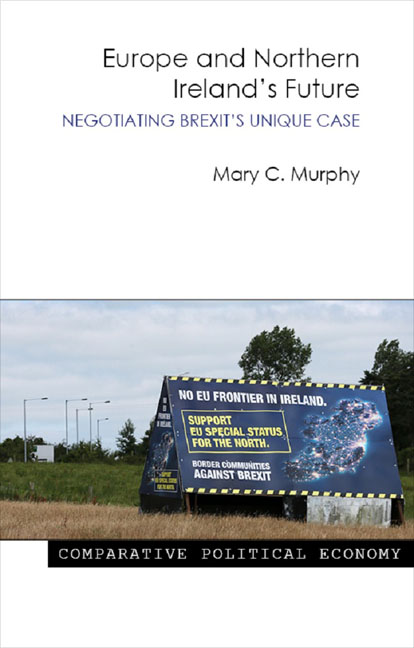Book contents
- Frontmatter
- Dedication
- Contents
- Acknowledgements
- Foreword
- Abbreviations
- 1 The political economy of a pressured relationship
- 2 The politicization of Brexit in Northern Ireland
- 3 When introverted politics and political economy collide
- 4 Who speaks for Northern Ireland?
- 5 Europe and Northern Ireland’s future
- References
- Index
5 - Europe and Northern Ireland’s future
Published online by Cambridge University Press: 16 August 2023
- Frontmatter
- Dedication
- Contents
- Acknowledgements
- Foreword
- Abbreviations
- 1 The political economy of a pressured relationship
- 2 The politicization of Brexit in Northern Ireland
- 3 When introverted politics and political economy collide
- 4 Who speaks for Northern Ireland?
- 5 Europe and Northern Ireland’s future
- References
- Index
Summary
Northern Ireland has overcome centuries of a violent and troubled past. The 1998 Belfast Agreement was a defining moment in the achievement of relative peace in Northern Ireland. The journey towards a permanent and stable peace, based on community reconciliation and ultimately integration, is, however, still a work in progress. Lingering differences epitomize the challenges associated with a “negative peace” and they underline the absence of trust that continues to aggravate political and community relations. Such is the power of these forces that they led to the suspension of the Northern Ireland power-sharing institutions during a crucial period after the EU referendum and during the Brexit negotiation period. Public policy issues lay victim to this dysfunctional political arena: progress on health, education, infrastructure and other policies and projects was stalled, while the Stormont chamber remained empty during its suspension. But perhaps even more problematic was the political silence on Brexit that suspension facilitated. Regrettable and potentially devastating, age-old sectarian quarrels prevented the people of Northern Ireland from having a voice in Brexit negotiations and decisions, and this posed a fundamental challenge to the region’s economic well-being and to peace and stability in Northern Ireland.
The process of the UK leaving the EU spans a two-year period from March 2017 to March 2019 and involves thrashing out both withdrawal terms and a new UK relationship with the EU. During the negotiations, the Irish issue has been a central priority. Finding agreement on this issue, and specifically the border question, proved especially challenging for negotiators. To some extent, the lack of clarity about the nature of the future UK–EU trading relationship inhibited the possibility of achieving early agreement. The determination that “sufficient progress” had been achieved during phase one of negotiations did not signify a resolution of the Irish issue, rather it meant that the full two-year negotiation period would involve continued discussion of how to prevent a hard border on the island of Ireland in the context of UK withdrawal.
A further difficulty in relation to Northern Ireland’s post-Brexit future related to the various options for managing the border between the UK and the Republic of Ireland.
- Type
- Chapter
- Information
- Europe and Northern Ireland's FutureNegotiating Brexit's Unique Case, pp. 123 - 154Publisher: Agenda PublishingPrint publication year: 2018



